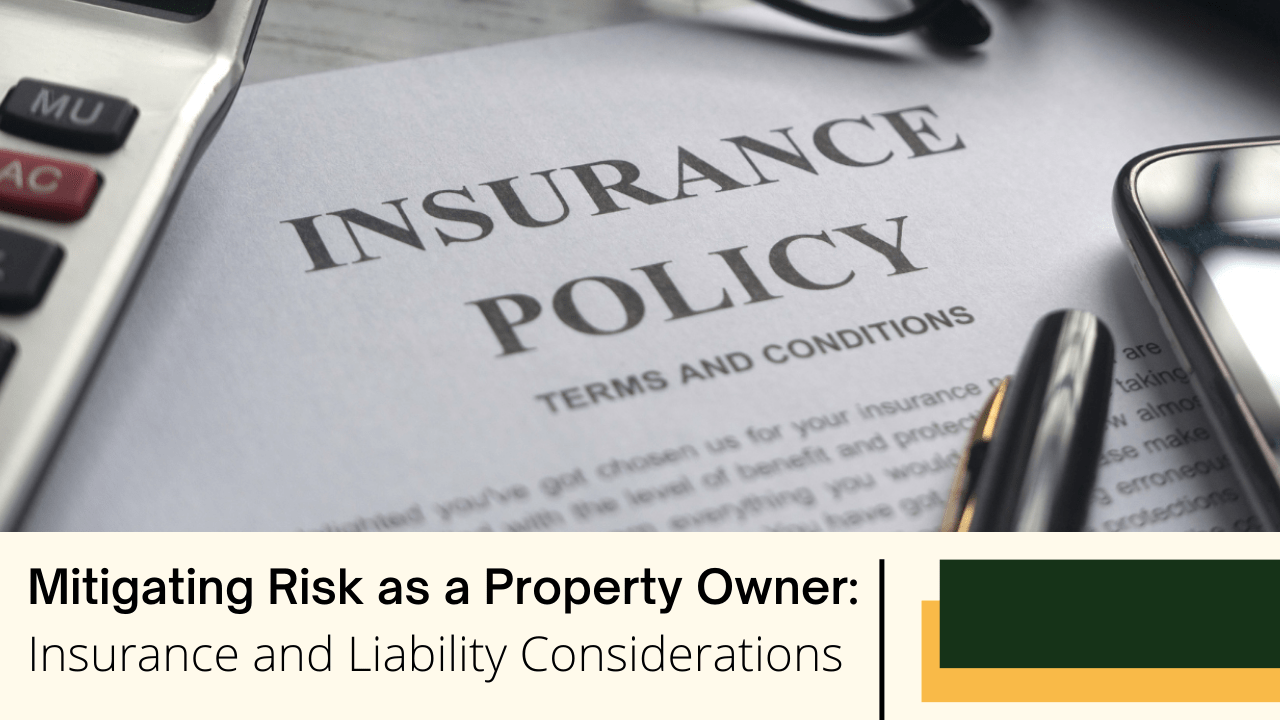
As a property owner in the picturesque city of Colorado Springs, it is imperative to be cognizant of the multifaceted challenges that can arise in safeguarding your real estate investments. With the city’s burgeoning population and robust real estate market, the responsibilities of property ownership in this region have evolved into a complex tapestry of considerations.
However, with the rewards of property ownership, certain risks require effective management. Property investors need to comprehend the importance of mitigating these risks. From natural calamities such as wildfires and hailstorms to potential accidents and injuries on the premises, proactively addressing and minimizing these risks is crucial to protect the property and the owner’s financial well-being.
Stay with us as we navigate through the intricacies of insurance and liability considerations, and pave the path to secure and successful property ownership in Colorado Springs.
Insurance for Property Owners
Colorado Springs has one of the most dynamic rental markets with a constant demand for rental properties. Additionally, the tax rates on property are low, with just 0.49%. However, Colorado Springs ranks as the fifth city most exposed to natural disasters.
The solution to protecting your property from natural calamities or general risks is insurance. Let us look at the overview of insurance and what property owners can consider to protect their property from natural disasters and liabilities.
Types of Insurance Coverage for Property Owners
Property owners need to assess their specific needs and risks to determine which types of insurance coverage are most suitable for their properties.
Property insurance
Landlord insurance, commonly called rental property insurance, is a kind of insurance that gives coverage for damage or loss to the property. Property insurance mainly includes two types of coverage: dwelling coverage and personal property coverage. Dwelling coverage protects the physical constitution of the property, including the walls, roof, and foundation. Personal property coverage covers the belongings inside the property, such as furniture, appliances, and personal items.
Liability insurance
Property insurance often includes liability coverage, which protects you financially if someone gets an injury on your property and you find yourself lawfully responsible. It can help cover medical expenses, legal fees, and other costs associated with the liability claim. This will protect the owners and cut the risk of liability.
Additional coverage options
Along with the dwelling, personal property, and liability insurance, property owners can get additional coverage to protect themselves from risks and reduce them. This additional coverage includes fire, theft, vandalism, windstorms, hail, and certain types of water damage. Some policies may offer additional coverage for specific perils like earthquakes or floods, which may require separate policies.
Factors Influencing Insurance Premiums
Here are several factors that may impact the cost of insurance policies.
Location of the property in Colorado Springs
The location of your property is essential in determining insurance premiums. Certain areas may have a greater risk of natural disasters, which can raise the likelihood of insurance claims. Additionally, crime rates in the neighborhood can impact premiums too.
Property type and condition
The type of property you own, whether a house, condominium, or apartment, can affect insurance premiums. The life and condition of the property can also be factors, as older properties may have outdated electrical or plumbing systems that pose higher risks.
Coverage limits and deductibles
The coverage limits you select for your property insurance will affect the premiums. Higher coverage limits provide more financial protection but generally result in higher premiums. Deductibles are the amount you compensate before the insurance coverage kicks in and can also impact premiums.
Claims history and risk factors
Your claims history can influence insurance premiums. If you have filed countless claims in the past, it may be perceived as a higher risk for insurers, potentially resulting in higher premiums. Certain risk factors associated with your property, like a history of previous damage, can also affect premiums.
Selecting an Insurance Provider
When selecting an insurance provider, consider a reputable company that meets your needs. You can start by researching insurance companies that operate in your area, paying attention to their history, financial stability, and customer satisfaction ratings.
Landlords can compare the coverage options and premiums offered by different insurance providers to find the most suitable insurance for their needs. Seek recommendations from friends, family, or trusted professionals who have had positive experiences with insurance companies.
Additionally, reading customer reviews and testimonials can provide valuable insights into each insurance provider’s level of service, claims handling, and overall customer satisfaction.
Real Estate Investor Liabilities
Understanding all the liabilities relating to real estate investment helps mitigate the risks and adhere to legal obligations.
Understanding Legal Obligations as a Property Owner
As a property owner, it is significant to understand and fulfill your legal obligations to ensure compliance with various laws and regulations. You are responsible for adhering to federal, state, and local laws that govern property ownership, such as zoning regulations, building codes, and environmental regulations.
Furthermore, you should consider maintaining a safe and habitable property for tenants or occupants. It includes ensuring the property meets health and safety standards, providing adequate maintenance and repairs, and promptly addressing potential hazards. It will ensure that the tenants live comfortably without risks to their well-being.
Tenant-Related Liabilities
As a property owner, there are several tenant-related liabilities that you should be aware of. Firstly, premises liability refers to the responsibility for injuries sustained by tenants. If a tenant or visitor gets hurt due to a hazardous condition on the premises, such as a slippery floor or faulty staircase, you may be liable for their hurt or damages.
Secondly, negligent maintenance or repairs can lead to harm to tenants. If you fail to address maintenance issues promptly, it could result in accidents or injuries to tenants. It is essential to fulfill your duty to maintain a safe and habitable living environment and address maintenance concerns promptly.
Lastly, while property owners are generally not held directly responsible for criminal acts committed by tenants, there may be circumstances where liability can arise. If you fail to take the needed steps despite knowing the situation, you can be liable for any harm caused to other tenants or individuals.
Third-Party Liabilities
Third-party liabilities as a property owner include injuries or damages to visitors and guests on the property and potential liabilities related to trespassers. If a trespasser gets injured on your estate, there may be some situations where you could still be liable.
Moreover, when hiring contractors for repairs or renovations, there is a potential liability for accidents or injuries that occur on the property during the contractor’s work. Maintaining secure living conditions, providing adequate warning of any known hazards, and having appropriate insurance coverage to protect against third-party liabilities are essential.
Mitigating Liabilities
It’s crucial to conduct regular property inspections, addressing any hazards promptly, to mitigate liabilities as a property owner. Implementing safety measures like proper lighting, fire alarms, and security systems can reduce the risk of incidents.
You should draft comprehensive lease agreements that outline tenant responsibilities and obtain tenant insurance to protect against potential damages. Additionally, you can maintain appropriate insurance coverage for your property. These steps create a safer environment, minimize risks, and mitigate potential legal liabilities as a property owner.
Professional Property Management Companies and Risk Mitigation
Property management companies assist expertly in mitigating the risks, cutting any ambiguity, and insurance-related services.
Risk Reduction through Professional Property Management
Professional property management is necessary for mitigating risks and liabilities for property owners. Thorough tenant screening ensures reliable tenants, including background checks and employment verification.
Drafting lease agreements and proper documentation enforce lease terms and comply with legal requirements. Timely property maintenance and a network of trusted contractors, prevents issues from escalating.
Handling tenant disputes and evictions requires mediation skills and knowledge of local laws. In emergencies, property managers provide round-the-clock availability for tenant emergencies and efficiently manage crises to minimize property damage.
By leveraging professional property management services, property owners can significantly reduce risks and liabilities associated with their properties.
Liability Coverage and Risk Transfer
Property management companies provide liability coverage through their insurance, protecting the company and the property owner. This coverage typically includes general liability, professional liability, and workers’ compensation. The property management agreement clearly defines the liability of the company, its responsibilities and obligations.
Additionally, indemnification clauses are included to transfer risks between the property owner and the management experts, ensuring that one party compensates the other for losses or damages incurred under specific circumstances. These measures establish a framework for shared risk management, allowing property owners to feel relief knowing that liability risks are adequately covered.
Expertise in Local Laws and Regulations
Property management companies in Pueblo and Colorado Springs possess expertise in local rental laws and regulations. They understand tenant rights, lease requirements, eviction processes, and other legal obligations specific to the area.
This expertise allows property management companies to navigate legal complexities, protect property owners’ interests, and maintain compliance, promoting a smooth and legally compliant rental operation.
Cost Considerations and Return on Investment
Cost and return on investment are important factors when considering property management services. Property owners can evaluate the fees charged by property management companies concerning the potential risk reduction. Property owners can achieve higher tenant retention, reduced vacancies, and a stable rental income by relying on professionals.
Additionally, property management services save owners valuable time by handling tasks such as tenant screening, rent collection, maintenance, and repairs, allowing them to focus on other priorities or investments.
Selecting a Reputable Property Management Company
 When selecting a reputable property management company, thorough research, checking references, and interviewing them are crucial. Collaboration between property owners and the chosen company is vital for success, as open communication and shared goals promote a productive partnership. Regular updates and reporting on property performance keep owners informed. Reviewing and adjusting risk mitigation strategies as needed ensures proper protection.
When selecting a reputable property management company, thorough research, checking references, and interviewing them are crucial. Collaboration between property owners and the chosen company is vital for success, as open communication and shared goals promote a productive partnership. Regular updates and reporting on property performance keep owners informed. Reviewing and adjusting risk mitigation strategies as needed ensures proper protection.
Muldoon Associates can provide valuable assistance on insurance and liability considerations. We have a team of experts who can assist you strategically in planning and mitigating the insurance and the best coverage for your rental property investment.
For more information on rental property insurance and its types, contact us at Muldoon Associates.
